Reflecting on 2011: where to start? 2011 has been another busy year for writers, analysts and students of foreign policy: from the Arab revolutions, to the nuclear disaster of Fukushima, to the war in Libya, to the Euro crisis, to the domestic turmoil in the US, so on and so forth. Instead of examining certain events, the reflection will instead focus on the policy-makers, the leaders of the European Union shaping policies. Not only will 2011 be remembered as the year of politics as usual, but also as the failure of the political class to lead. Politicians, especially in Europe, have shown how difficult it is to lead in a globalized world, as illustrated by the attempts at solving the financial crisis, the Eurozone crisis and other crises around the globe. In order to review the year of 2011, I will be giving awards to the members of the European political class based on their accomplishments, behaviors and leading skills throughout 2011.
Silence Award: High Representative Lady Ashton. Ms. Ashton, heading the newly created EEAS, has not only been unable to lead the EU in foreign 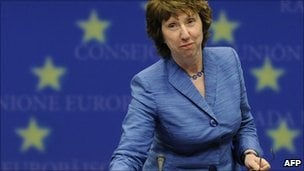 policy, but has also failed in maintaining the international status of the EU as a global security actor. Ms. Ashton has emerged as a bureaucrat with limited strategic vision. Taking the case of the Tunisian and Egyptian revolutions would be unfair, as no Western countries saw them coming; however, Ms. Ashton has not been able to fight for a place for the EU in the operation in Libya. The EUFOR Libya has not been deployed. Now, with the current violence in Syria, the EU is once again missing. Furthermore, new reports are emerging about the fact that Ms. Ashton will not deploy new CSDP missions until the current problems in presently deployed missions, such as in Kosovo and Georgia, are solved. This could mean the end of CSDP operations. Experts have dubbed the new EU strategy shaped by Ms. Ashton as the so-called ‘sound of silence.’
policy, but has also failed in maintaining the international status of the EU as a global security actor. Ms. Ashton has emerged as a bureaucrat with limited strategic vision. Taking the case of the Tunisian and Egyptian revolutions would be unfair, as no Western countries saw them coming; however, Ms. Ashton has not been able to fight for a place for the EU in the operation in Libya. The EUFOR Libya has not been deployed. Now, with the current violence in Syria, the EU is once again missing. Furthermore, new reports are emerging about the fact that Ms. Ashton will not deploy new CSDP missions until the current problems in presently deployed missions, such as in Kosovo and Georgia, are solved. This could mean the end of CSDP operations. Experts have dubbed the new EU strategy shaped by Ms. Ashton as the so-called ‘sound of silence.’
Keeping it Cool Award: German Chancellor Angela Merkel. She is leading the only European economy with actual growth and world standing. She has had to deal with European leaders in solving the Eurozone crisis, while facing major criticisms domestically. She has also been able to find some sort of balance and is keeping a strategic approach in dealing with spirited leaders such as Mr. Berlusconi, Mr. Sa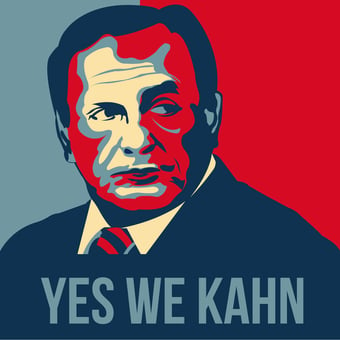 rkozy, Mr. Cameron and others.
rkozy, Mr. Cameron and others.
Self-Destruction Award: Mr. Dominique Strauss-Khan deserves this award. He was leaving the IMF with a huge international recognition and the prestige for transforming the IMF into a relevant and reliable international actor. He was supposed to become the next President of France. Instead, the New York drama in May has ruined all his chances to lead France. Since then, he has been spending these last months in courts fighting allegations of sexual harassment, limiting further chances of a possible comeback.
Survival Skills Award: Italian Prime Minister Silvio Berlusconi. One could claim that the award is not appropriate considering the recent 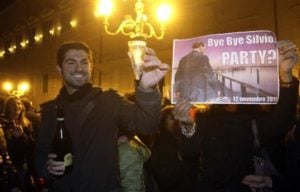 resignation of Mr. Berlusconi in November 2011. However, after being in power for 17 years, it is important to look at the bigger picture. Public discontents in Italy have been high for years now, and the Italian Prime Minister managed to remain in power with a political majority. Il Cavaliere has been quite incredible in maintaining his grip over power with all the external, domestic, and personal pressures that he has been facing in recent years. His handling of the economic situation in Italy has been abysmal, with a continuity of the economic status quo. Even with his personal problems with the Italian justice system, he has been able to maintain the rank of Italy on the international stage and secure the Presidency of the ECB to an Italian, Mario Draghi. His grip over Italy is still strong, and no-one should expect to see the end of the Berlusconi era; he will be back in one way or another.
resignation of Mr. Berlusconi in November 2011. However, after being in power for 17 years, it is important to look at the bigger picture. Public discontents in Italy have been high for years now, and the Italian Prime Minister managed to remain in power with a political majority. Il Cavaliere has been quite incredible in maintaining his grip over power with all the external, domestic, and personal pressures that he has been facing in recent years. His handling of the economic situation in Italy has been abysmal, with a continuity of the economic status quo. Even with his personal problems with the Italian justice system, he has been able to maintain the rank of Italy on the international stage and secure the Presidency of the ECB to an Italian, Mario Draghi. His grip over Italy is still strong, and no-one should expect to see the end of the Berlusconi era; he will be back in one way or another.
Best Joke Award: Former Greek Prime Minister Papandreou for calling for a referendum on the bail-out plan. Nobody in Europe expected such a move at that time, not even his advisers. Mr. Papandreou took European and world leaders by surprise a week before an important G-20 meeting in Cannes, where European leaders were supposed to call for external funding from the US and China. President of France, Nicolas Sarkozy, was taken short and changed his approach to the G-20 meeting from a strategy of European Unity to a crisis management approach. The call for a referendum scared world leaders over the European’s credibility in actually wanting to solve the crisis, while exposing the considerable tensions within EU Member States. This move also cost Mr. Papandreou his job.
Leadership Award: French President Nicolas Sarkozy for going to Libya. After the lack of prediction by the members of the E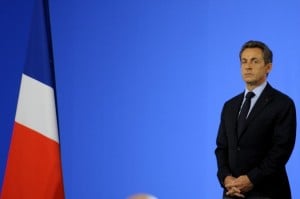 uro-Atlantic community about the Tunisian and Egyptian revolutions, Libya was perceived as a way to exorcise their ghosts. France and Britain saw the violence perpetuated by Mr. Qaddafi against the rebels as a clear violation of international law. The use of the UN Security Council in order to establish a legitimate/legal military operation, based on the concept of Responsibility to Protect, was quite a political move/gamble. Russia and China have since then been reticent to launch any other military operations based on the same principles. The success in overthrowing Mr. Qaddafi from power after 41 years was a symbol of success for a multilateral military operation under NATO umbrella. Mr. Sarkozy gambled and emerged victorious. Despite his domestic unpopularity, Mr. Sarkozy has emerged as one of the sharpest politicians when it comes to foreign policy. This Libyan mission will undeniably become a textbook case of a successful multilateral military operation.
uro-Atlantic community about the Tunisian and Egyptian revolutions, Libya was perceived as a way to exorcise their ghosts. France and Britain saw the violence perpetuated by Mr. Qaddafi against the rebels as a clear violation of international law. The use of the UN Security Council in order to establish a legitimate/legal military operation, based on the concept of Responsibility to Protect, was quite a political move/gamble. Russia and China have since then been reticent to launch any other military operations based on the same principles. The success in overthrowing Mr. Qaddafi from power after 41 years was a symbol of success for a multilateral military operation under NATO umbrella. Mr. Sarkozy gambled and emerged victorious. Despite his domestic unpopularity, Mr. Sarkozy has emerged as one of the sharpest politicians when it comes to foreign policy. This Libyan mission will undeniably become a textbook case of a successful multilateral military operation.
Indecision Award: British Prime Minister David Cameron. Should I stay or should I go? This ongoing debate in Britain concerning the continuity of the European adventure has become quite old and redundant. French President Charles de Gaulle twice opposed the integration of Britain to the EU for the 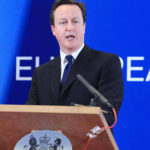 reason that he never saw Britain as fully committed to the European project. Since the election of Mr. Cameron, a British conservative, debates in England about leaving the EU have re-emerged. The eurosceptic narratives have risen at a time where Mr. Cameron has been calling his European counterparts to fix the Euro crisis as it is impacting British recovery. Mr. Cameron’s narratives on the British-EU relations have been poorly chosen. For example, during a speech, Mr. Cameron declared that leaving the EU was “not in our national interest,” but said he felt “very personally” that now was the time for a fundamental reconsideration of European relations.” The Eurosceptic narratives – ideologically embedded in the national interests of the country – rising once again from Britain are not constructive in this period of turmoil. This move may be attractive to the British electorate, but could cost a certain aura of credibility and confidence in Europe on British contribution to the European experiment.
reason that he never saw Britain as fully committed to the European project. Since the election of Mr. Cameron, a British conservative, debates in England about leaving the EU have re-emerged. The eurosceptic narratives have risen at a time where Mr. Cameron has been calling his European counterparts to fix the Euro crisis as it is impacting British recovery. Mr. Cameron’s narratives on the British-EU relations have been poorly chosen. For example, during a speech, Mr. Cameron declared that leaving the EU was “not in our national interest,” but said he felt “very personally” that now was the time for a fundamental reconsideration of European relations.” The Eurosceptic narratives – ideologically embedded in the national interests of the country – rising once again from Britain are not constructive in this period of turmoil. This move may be attractive to the British electorate, but could cost a certain aura of credibility and confidence in Europe on British contribution to the European experiment.
Best European Politician Award : This award must go without doubt to Ms. Merkel. She is the ultimate European leader at the head not only of the strongest European economy, but also leading the EU. Ms. Merkel’s phone number has become the telephone number of the EU. As argued by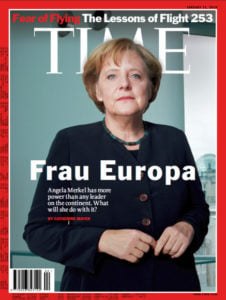 Quentin Peel of the Financial Times, Angela Merkel should be also called ‘Madame Europa.’ She has been calling for more Europe rather than less, and has not been scared to talk of an eventual political union. As argued by Prof Langguth, “she is a pragmatic problem-solver, not ideological. She can change her position from one day to another.” Her position to stick behind the European project despite domestic complains shows her commitments.
Quentin Peel of the Financial Times, Angela Merkel should be also called ‘Madame Europa.’ She has been calling for more Europe rather than less, and has not been scared to talk of an eventual political union. As argued by Prof Langguth, “she is a pragmatic problem-solver, not ideological. She can change her position from one day to another.” Her position to stick behind the European project despite domestic complains shows her commitments.
In conclusion, three points need to be underlined in order to think about what is next for 2012. First, it appears that the Eurozone crisis is even worse than expected. Germany has recently even been unable to sell all its bonds, which were once regarded as the safest. The cases of Greece, Spain, Italy and Portugal are quite alarming as they have finally spilled-over to France, Germany, and the Scandinavian countries. France is fighting the markets in order to maintain its Triple-A rating. 2011 was not the year of recovery as expected and planned. Based on the instability/volatility of the markets, 2012 could be even worst.
The second point is that politicians may become an endangered species in Europe with the latest trend of appointing technocrats such as Mr. Monti at the head of Italy and Mr. Papandremos of Greece. It will be interesting to see how technocrats will manage this difficult situation of balancing necessary/painful reforms with public demands.
Last but not least, the year 2012 will be a year of global elections. As written in a previous blog, four EU Member States as well as the United States, China, Russia, India, Mexico and so on will see a change of leadership and ultimately political direction. The relations between states and the market will be very interesting to monitor.